JANUARY
The Birth of the Nazis – How the Freikorps blazed a trail for Hitler : Nigel Jones 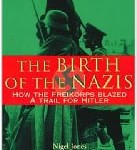 In reality I finished this book before the end of 2009 but have only now found time to write about it. The first drawback with the book is the title, the emphasis is on the Nazis, but the real story is about the Freikorps. I know why the author has done this, the Nazis sell books, the general public know about Hitler and the Third Reich, but know little about the Weimar period. With this in mind I found the writing very open, accessible to the general reader, and as a result I found it a pleasure to read, the complexity of the German Republican political situation was not simplified, but was shown in broad strokes, making reference and understanding clearer. The book was cheap, as I got it from Borders, which are closing down, but it did everything I would want from this type of book, it informed, re-enforced some of my knowledge and inspired me to research more deeply this period. I will be looking for other books written by Nigel Jones, and others in the ‘A brief History of’ series’.
In reality I finished this book before the end of 2009 but have only now found time to write about it. The first drawback with the book is the title, the emphasis is on the Nazis, but the real story is about the Freikorps. I know why the author has done this, the Nazis sell books, the general public know about Hitler and the Third Reich, but know little about the Weimar period. With this in mind I found the writing very open, accessible to the general reader, and as a result I found it a pleasure to read, the complexity of the German Republican political situation was not simplified, but was shown in broad strokes, making reference and understanding clearer. The book was cheap, as I got it from Borders, which are closing down, but it did everything I would want from this type of book, it informed, re-enforced some of my knowledge and inspired me to research more deeply this period. I will be looking for other books written by Nigel Jones, and others in the ‘A brief History of’ series’.
The first of the books I got for Christmas. My mother is a fan of Fleetwood Mac and I first heard them from her collection, and have the famous ‘Rumours’ album. I came to this book with a totally open mind, after all it was not my usual Historical non-fiction. I must say it was interesting without telling me anything I did not expect, I knew they lived the ‘rock and roll lifestyle’ of drugs and partying, so nothing surprised me. Sometime the writing style irritated me a bit, but Carol Ann Harris is not a writer, thus it appears that she truly wrote this herself, no ghost writer? I am not sure what I will take from this book, except maybe listen to the songs with a new insight. I cannot say the book is one of the best i have read, it is certainly not the worst, and I finished it without a struggle, wanting to know what would happen next, its just that it leaves a gap, I now have some knowledge of Fleetwood Mac during the Rumours tour, but not of their earlier career. All in all a nice break from the History.
This book details the failure of the Anglo-Jewish community and its leaders attempts to alter the British policy of blockading the Jews of the continent during the Holocaust, looking at how they reacted to the growing tragedy. I use the word ‘detailed’ in context, as it has an academic style, not suited to general readership, it did, however, greatly add to my understanding of the British Government’s policy in the 1930’s and 1940’s. I feel that this book gives a reasonably balanced account, and does not step into trying to blame any person or institution, although it did re-enforce my opinion of Anthony Eden, highlighting his vacillation and deceit. I was pleased to see a chapter on the Eire Government’s response, as this is a sadly neglected aspect, Dr Sompolinsky clarified many points, and explained a number of complex issues in a clear way, without simpifying the issues involved. This book added to my knowledge and understanding, bringing some of my interests into a wider context.
Personal Experiences of World War Two is a book produced by the Rotary Club of Cleveland, to which my father is a member. In August 2008 Howard Mark gave a talk to the club about his wartime experiences, as others added their own recollections the idea developed to compile the stories into a book, thus Rotarians across Teesside contributed their wartime experiences. I found this book difficult to put down and read it in just two nights. Each account gives a brief outline of a personal story, and as such adds to the context of the war, focusing not only on the Home Front, but experiences in all theatres (air, sea, Europe and the Far East). I feel sure I will be able to make full use of this. Many thanks Dad, it was a wonderful Christmas Gift.
As a Huge Dylan fan I was very pleased to receive this as a Christmas present. I know his life story, I have read other biographies, thus, there was no new or shocking information contained in the book. I found the book well written, as a consequence, an easy read, it also placed a lot of the music into a deeper context, I also like the way Howard Sounes addressed some of the myths, something lacking in other biographies I has read, giving a fuller picture of his career. Sadly the book is now ten years old, so the past 10 years are not covered, as 2000 was the first time I saw him live in concert, the book covers the period I experienced Bob Dylan through his records only.
Rarely do I come across a book I don’t want to end, but this was one such. 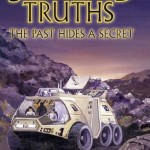 Craig Hornby put me onto David Jowsey’s first book Dragons in the Sky, as it was set mainly in the Eston Hills. This book by contrast was set almost entirely on Mars, and took the story towards a different direction to the one I anticipated, but this was wonderful, I could see the influence of Arthur C Clarke and Carl Segan, but this was not a copy of their work, this was an exiting tale unlike theirs, for Jowsey focused closely upon the characters. I read this book quickly as I was eager to read on and see the outcome of the latest twist in the story line. This trilogy comes highly recommended, I eagerly await the conclusion of the trilogy.
Craig Hornby put me onto David Jowsey’s first book Dragons in the Sky, as it was set mainly in the Eston Hills. This book by contrast was set almost entirely on Mars, and took the story towards a different direction to the one I anticipated, but this was wonderful, I could see the influence of Arthur C Clarke and Carl Segan, but this was not a copy of their work, this was an exiting tale unlike theirs, for Jowsey focused closely upon the characters. I read this book quickly as I was eager to read on and see the outcome of the latest twist in the story line. This trilogy comes highly recommended, I eagerly await the conclusion of the trilogy.
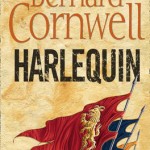 I Have been reading Bernard Cornwell for almost thirty years, starting with ‘Sharpe’s Eagle’, but I grew tired of the formulaic nature of the later Sharpe books, and disliked the retrospective ones. I liked the Anglo-Saxon based books, thus I took the opportunity of looking at his new era (Hundred Years War) as the book was only £1. Although set during the Crecy campaign I felt that the author falls into the trap of writing a “Sharpe in a different costume’ novel, I could not get away from comparison. I finished the book, and would not say I disliked reading it, but it was a bit of a disappointment, as it was so similar to the Sharpe formula. I still like Cornwell’s style, and he can write a good story, thus I can say I may read more of his work, but I must try not to look for the writers formula, especially as it has proved to be so successful for the author.
I Have been reading Bernard Cornwell for almost thirty years, starting with ‘Sharpe’s Eagle’, but I grew tired of the formulaic nature of the later Sharpe books, and disliked the retrospective ones. I liked the Anglo-Saxon based books, thus I took the opportunity of looking at his new era (Hundred Years War) as the book was only £1. Although set during the Crecy campaign I felt that the author falls into the trap of writing a “Sharpe in a different costume’ novel, I could not get away from comparison. I finished the book, and would not say I disliked reading it, but it was a bit of a disappointment, as it was so similar to the Sharpe formula. I still like Cornwell’s style, and he can write a good story, thus I can say I may read more of his work, but I must try not to look for the writers formula, especially as it has proved to be so successful for the author.
Love that dog is a strange book, one is never sure it is a poem or a book about a poem, or a poem disguised as a book. The story is about Jack, a young boy being introduced to poetry by his teacher. we see his growing confidence and enthusiasm, as well as seeing some insight into his world, especially his excitement in getting a dog. This brief book/poem is inspiring, as one feels the multi-layered aspects of the book. Sharon Creech is obviously a gifted writer, and she has a website which seems full of exiting material (http://www.sharoncreech.com/novels/01.asp). I feel sure this is an author I will revisit. The book is short, so it took a few hours to read, but this was a bit more than simply reading the work, one needs to get into the process, begin to read it as a poem, to explore the syntax and rhythm. This may just be a book I will be able to read and then re-read. 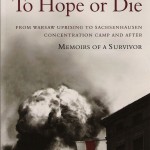 This is an unusual Memoirs of a survivor, as the survivor in question is Polish, but not Jewish, the reason he was sent to Sachsenhausen rather than Auschwitz-Birkenau. I was pleased to see that the author focused less on his camp experiences than on his later life, which places his experiences in context. This is not to say these experiences are unimportant, they clearly effected his whole life, in fact the book ends with the author recalling his time in Warsaw, and the death of his first girlfriend; the one person who he mentions throughout the book. The books style shows that this was not written for Edmund Szybicki, it would certainly benefit from another edit, to get away from constant repetition, and many points could be elaborated upon. The book made me think about the production of memoirs, yes the Warsaw uprising and the concentration camp experience are the parts people will be most interested in, but these events are 60 years in the past for the author, whereas his life in Switzerland is much more recent, thus he should be able to remember the latter in more detail. The most useful aspect, therefore, is that he remembers the most significant events, most significant to him, and this is telling, I too will be haunted by the image he creates of the Strafkommando prisoners suffering their punishment in silence. This book adds to our knowledge in a number of ways, it does not attempt to tell a story, it is the recollections of a survivor, recalling what he can remember, and as such is a triumph.
This is an unusual Memoirs of a survivor, as the survivor in question is Polish, but not Jewish, the reason he was sent to Sachsenhausen rather than Auschwitz-Birkenau. I was pleased to see that the author focused less on his camp experiences than on his later life, which places his experiences in context. This is not to say these experiences are unimportant, they clearly effected his whole life, in fact the book ends with the author recalling his time in Warsaw, and the death of his first girlfriend; the one person who he mentions throughout the book. The books style shows that this was not written for Edmund Szybicki, it would certainly benefit from another edit, to get away from constant repetition, and many points could be elaborated upon. The book made me think about the production of memoirs, yes the Warsaw uprising and the concentration camp experience are the parts people will be most interested in, but these events are 60 years in the past for the author, whereas his life in Switzerland is much more recent, thus he should be able to remember the latter in more detail. The most useful aspect, therefore, is that he remembers the most significant events, most significant to him, and this is telling, I too will be haunted by the image he creates of the Strafkommando prisoners suffering their punishment in silence. This book adds to our knowledge in a number of ways, it does not attempt to tell a story, it is the recollections of a survivor, recalling what he can remember, and as such is a triumph. 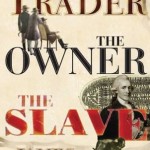
What a wonderful book The Trader The Owner The Slave is, this must be one of the best books I have read for some time. The Trader of the title is John Newton, more famous for the hymn ‘Amazing Grace’, The Owner is Thomas Thistlewood, who’s diary has proved to be so valuable a resource, lastly The Slave is Olaudah Equiano who needs no introduction to anyone familiar with the abolition of the slave trade. James Walvin has written an interesting and special book here, it is more than its three parts; the story of three lives, three men trapped within the slave trade. The author has bound the three stories together, but in a subtle way, highlighting the links and contrasts more fully than if he had made the links more explicit. It would have been easy to link the three stories more strongly, for they are contemporaries and are all heavily involved in the slave trade, but the author has skillfully used these stories to emphasise the bigger picture, that of the slave trade itself. For someone like myself who is very familiar with these three individuals, James Wavin has managed to keep the stories fresh, with an emphasis on interesting detail, for those less familiar he has painted a vivid picture of the brutality of the slave trade, whilst giving interesting insights into characters many will know of by name.
The Curious Incident of the dog in the night-time This book is an advert for how small stories can give us the insight and depth to explore bigger issues. 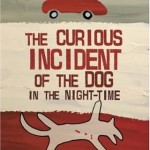 I had heard a lot of good things about Mark Haddon’s book, and thankfully it lived up to expectations, it was interesting, and especially pleasing was the use of language and punctuation, which added to the story. It is written for Children, but I feel it is not condescending, and read well. I felt it gave me a better understanding of myself and how some students think.
I had heard a lot of good things about Mark Haddon’s book, and thankfully it lived up to expectations, it was interesting, and especially pleasing was the use of language and punctuation, which added to the story. It is written for Children, but I feel it is not condescending, and read well. I felt it gave me a better understanding of myself and how some students think. 
Night is the autobiography of the Nobel Peace Prize Winner Ellie Wiesel. The book describes his; deportation, ghetto experience, transportation, selection, camp experience and death march. I have been holding off reading this book due to is reputation, and as a result, I was surprised by my reaction to it, I was impressed by his writing style, the horrors he relates became very much secondary to the description of the changing relationship with his father; from dependency upon his father through care and concern to indifference to his death. Wiesel takes one into the darkness of the human spirit, but does not provide the ‘happy ending’, this book will leave one cold and in shock, I felt a little numbed after reading it, but awed by his courage, strength and inner-humanity. this is not an account of one man who overcame evil, it is an account of one man’s experience, and for that I am grateful.
April I will confess this was bought for Mrs Fox, as a Christmas present. Once she read it she passed it to me, saying I would probably enjoy it, and I certainly did. I was unaware that Stephen Fry wrote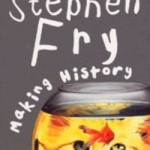 Science-Fiction, I was unaware that Stephen Fry wrote fiction so well, although now I admit I should have really known. The ‘hero’ is an Historian and the Third Reich is mentioned in detail, thus I can say that this book brought some interesting insights, making me think about certain issues of History and Nazism in a different and interesting way. I must say that I enjoyed the style of writing as much as the content, reading this avidly. The Independent says about the book
Science-Fiction, I was unaware that Stephen Fry wrote fiction so well, although now I admit I should have really known. The ‘hero’ is an Historian and the Third Reich is mentioned in detail, thus I can say that this book brought some interesting insights, making me think about certain issues of History and Nazism in a different and interesting way. I must say that I enjoyed the style of writing as much as the content, reading this avidly. The Independent says about the book
‘A powerful imaginative pull that keeps the pages turning while the tea goes cold and the cat gets the goldfish’
It is all that and for me much more. One of the most enjoyable books I have read this year.
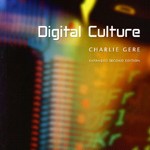 I must admit this book was a little heavy going at first, but quickly got into its stride, as the author moved from detailed description to detailed argument. Charlie Gere argues that digital culture is neither new nor determined by technology, but rather that technology is a product of digital culture. According to Gere, the term “digital” originally referred to data organized in discreet units in any system, linguistic, and numerical systems included. The term became synonymous with digital binary computer systems only recently. In the first two chapters of Digital Culture Gere summarizes technical, theoretical and cultural phenomena that lead to the development of the digital computer. He examines this history in the context of the growth of capitalism arguing that the abstraction of materials and processes and the standardization of signs facilitate the flow of goods, money and people. What I found interesting about this book was that the author pays as much attention to theoretical discourses directly or indirectly related to the history of computers as to historical documentation of the technology, making this a though provoking book as well as a trigger to my memories.
I must admit this book was a little heavy going at first, but quickly got into its stride, as the author moved from detailed description to detailed argument. Charlie Gere argues that digital culture is neither new nor determined by technology, but rather that technology is a product of digital culture. According to Gere, the term “digital” originally referred to data organized in discreet units in any system, linguistic, and numerical systems included. The term became synonymous with digital binary computer systems only recently. In the first two chapters of Digital Culture Gere summarizes technical, theoretical and cultural phenomena that lead to the development of the digital computer. He examines this history in the context of the growth of capitalism arguing that the abstraction of materials and processes and the standardization of signs facilitate the flow of goods, money and people. What I found interesting about this book was that the author pays as much attention to theoretical discourses directly or indirectly related to the history of computers as to historical documentation of the technology, making this a though provoking book as well as a trigger to my memories.
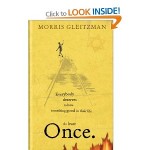 Once by Morris Gleitzman is a ‘childrens’ book, short; at just 160 pages, I managed to read it in just two sittings, but this was mainly because I could not put it down. It is similar to ‘The Boy in the striped Pyjamas’ in that it is written from the perspective of a young boy. Felix is living in a convent orphanage high in the mountains in Poland. When a group of Nazi soldiers come and burn the nuns’ books, Felix is terrified that his Jewish, bookseller parents will also be in danger, he sets out to help them. Escaping from the orphanage, Felix embarks on a long and dangerous journey through Nazi occupied Poland. The author really draws you in, the style of writing making it easy and enjoyable to read, I kept thinking of Janusz Korczak as I read the book, not really knowing why, except the mention of the orphanage and then the character Barney. At the end Morris Gleitzman mentions Korczak, showing the influence.
Once by Morris Gleitzman is a ‘childrens’ book, short; at just 160 pages, I managed to read it in just two sittings, but this was mainly because I could not put it down. It is similar to ‘The Boy in the striped Pyjamas’ in that it is written from the perspective of a young boy. Felix is living in a convent orphanage high in the mountains in Poland. When a group of Nazi soldiers come and burn the nuns’ books, Felix is terrified that his Jewish, bookseller parents will also be in danger, he sets out to help them. Escaping from the orphanage, Felix embarks on a long and dangerous journey through Nazi occupied Poland. The author really draws you in, the style of writing making it easy and enjoyable to read, I kept thinking of Janusz Korczak as I read the book, not really knowing why, except the mention of the orphanage and then the character Barney. At the end Morris Gleitzman mentions Korczak, showing the influence. 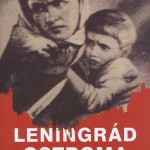
Coming from Cassell publications I was expecting a good Military history when I saw The Siege of Leningrad, and David Glantz did not disappoint, in fact at times there was a little too much military detail, giving the exact movements of specific units, making this a very good work for reference.I do not think this would please the general reader as it does not look at the Siege itself, and the effects on Leningrad as a City, but rather looks at the military campaigns to attack , defend and liberate the City. The sheer scale of the ‘battle’ becomes apparent when Glantz summarises the casualty figures; although ‘only’ 10% of the total Soviet casualties were in this Leningrad sector, they are still more than six times the total USA casualties for the whole of the Second World War! This is a very good military history of the Northern Sector of the Great Patriotic War, giving me a new insight into Soviet military strategy.
May
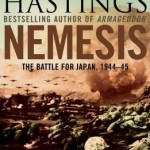 It has taken me almost the full month to read this monumental book, a detailed and scholarly study of the end of the Pacific War. The blend between narrative and testimony is excellent, keeping the interest whilst placing the testimony in context. I also like the style of the author, he pulls no punches and explains simply, for example the character of MacArthur comes through clearly, as the loathsome individual I have seen him as, although i have never seen it outlined so clearly. Written as an overview it gives a balance account, looking at each area of operations in detail, without letting the US involvement swamp the overall picture and placing it well within the context of the Second World War in general:a secondarily theatre of operations. I was also impressed with the final concluding chapter in which Max Hastings makes his judgements, an unusual aspect, as most Historians tend to disguise their opinion in analysis, here the judgements are bold, as the views on Modern Japan clearly illustrate. Max Hastings describes the horrific nature of the Pacific conflict, without glorifying it, a truly awesome book.
It has taken me almost the full month to read this monumental book, a detailed and scholarly study of the end of the Pacific War. The blend between narrative and testimony is excellent, keeping the interest whilst placing the testimony in context. I also like the style of the author, he pulls no punches and explains simply, for example the character of MacArthur comes through clearly, as the loathsome individual I have seen him as, although i have never seen it outlined so clearly. Written as an overview it gives a balance account, looking at each area of operations in detail, without letting the US involvement swamp the overall picture and placing it well within the context of the Second World War in general:a secondarily theatre of operations. I was also impressed with the final concluding chapter in which Max Hastings makes his judgements, an unusual aspect, as most Historians tend to disguise their opinion in analysis, here the judgements are bold, as the views on Modern Japan clearly illustrate. Max Hastings describes the horrific nature of the Pacific conflict, without glorifying it, a truly awesome book.
As Going Postal is being shown on Sky, I thought I would return to a non-Discworld book, this is a clever book, I read firstly when it came out in the mid 1990s, and have recently found again, thus I read it with a substantial gap, it certainly took me back to my youth, and has a good Historical feel, like may of Pratchett’s book there are many layers, and like Philip K Dick’s book, it makes one think about the ffects of technology, without becoming too technical. I re-read this in a day, well some of it late at night, but you know what I mean.
June
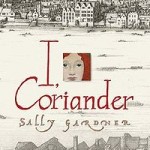 I must admit that I am reading another book and this was picked up for my train journey to London, thus most of it was read on the Saturday. It is a childrens book, and as such was easy to read, it is a farytale set in the time of the Commomwealth, sadly I could not get over the poor History to enjoy the fairytale, it was lazy History, with poor characterisation, just because it is for younger readers does not mean it can be of a lower standard, in fact I would argue the opposite. This seemed rushed and ill thought out throughout, the ending highlighted this, almost a ‘they all lived happily ever after’ paraphrase. Sadly I felt let down by the book, the huge gaps in the narrative gave it a disjointed feel, this could be because I am used to Mikhail Bulgakov’s works, which puts this book to shame. It served its purpose of distracting me for a few hours on a train, other than that it served no purpose, except to highlight that I should read reviews before I purchase books.
I must admit that I am reading another book and this was picked up for my train journey to London, thus most of it was read on the Saturday. It is a childrens book, and as such was easy to read, it is a farytale set in the time of the Commomwealth, sadly I could not get over the poor History to enjoy the fairytale, it was lazy History, with poor characterisation, just because it is for younger readers does not mean it can be of a lower standard, in fact I would argue the opposite. This seemed rushed and ill thought out throughout, the ending highlighted this, almost a ‘they all lived happily ever after’ paraphrase. Sadly I felt let down by the book, the huge gaps in the narrative gave it a disjointed feel, this could be because I am used to Mikhail Bulgakov’s works, which puts this book to shame. It served its purpose of distracting me for a few hours on a train, other than that it served no purpose, except to highlight that I should read reviews before I purchase books.
July
As a huge Terry Pratchett fan I find I can return to his book, I read the Carpet people a number of years ago. I like the concept of Terry re-writing the book when he is 21 years older. I have in the back of my mind a reference in TP’s Eric to people living in the carpet, but this may just me my imagination. This is not a ‘typical’ Pratchett book, but it is full of his usual humour, for example the varnish is sources from the mysterious “achairleg” and the only metal is from a discarded penny, and the carpet stretches to the “Hearth lands” which are warm. I enjoy reading this for a change, and always enjoy reading it, hopefully it won’t be 15 years.
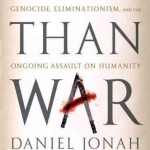 It has taken me a while to read this, as I found this book mind blowing, see : https://foxburg.edublogs.org/2010/07/11/worse-than-war-daniel-goldhagen/ for a more detailed review
It has taken me a while to read this, as I found this book mind blowing, see : https://foxburg.edublogs.org/2010/07/11/worse-than-war-daniel-goldhagen/ for a more detailed review
 After such an academically challenging book as Worse than War id decided on some light reading, a book written for Children, this one made me laugh out loud again, and poor Mrs Fox was subjected to quotes. This is the second of the Johnny Maxwell trilogy, pPart of the story deals with the last surviving member of a Pals battalion, he is called Tommy Atkins, the name given to the generic British soldier of the day, and the name that many, even the enemy, used throughout the Great War and the Second World War. This is something I did not really notice in the late 90s when I read this first, but now, catches the imagination of my inner History Teacher.
After such an academically challenging book as Worse than War id decided on some light reading, a book written for Children, this one made me laugh out loud again, and poor Mrs Fox was subjected to quotes. This is the second of the Johnny Maxwell trilogy, pPart of the story deals with the last surviving member of a Pals battalion, he is called Tommy Atkins, the name given to the generic British soldier of the day, and the name that many, even the enemy, used throughout the Great War and the Second World War. This is something I did not really notice in the late 90s when I read this first, but now, catches the imagination of my inner History Teacher.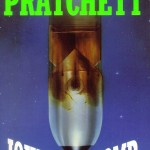
With all these day off I am getting through these short books quickly, Johnny and the Bomb is the last of the Johnny Maxwell trilogy, I read this over a decade ago and have used some of the tv series in lessons, but I always find the book more rewarding, as the changes made for the TV series take something away from the story. For the first time I read this purely for pleasure, and again laughed out loud, and once again thought that this could be a much deeper novel, exploring time travel in greater depth. I think this trilogy has inspired me to re-read the ‘Wee Free men’ novels.
August
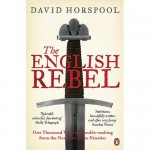 I have been mightily impressed with this book by David Horspool. This does cover ‘rebellions’ from the Normans to the Poll Tax riots, and this is one weakness of the book, its broad strokes, leaving me wanting to know more, and sometimes rejecting his conclusions, as they seemed not to assess a particular event in sufficient detail to avoid simplification, and sometimes his conclusions were too simple for me. That said, it was a thought provoking book, and inspiring, for example the linking between the 1926 General Strike and the ’72 & ’84/’85 Miner Strikes has allowed me to pursue a line of enquiry that I might otherwise have neglected. I liked this book because it was challenging, I did not agree with the author on a number of points, thus I was challenged to think about issues, the book has allowed me to look at some familiar events and issues in a different light, for that it is a true gem.
I have been mightily impressed with this book by David Horspool. This does cover ‘rebellions’ from the Normans to the Poll Tax riots, and this is one weakness of the book, its broad strokes, leaving me wanting to know more, and sometimes rejecting his conclusions, as they seemed not to assess a particular event in sufficient detail to avoid simplification, and sometimes his conclusions were too simple for me. That said, it was a thought provoking book, and inspiring, for example the linking between the 1926 General Strike and the ’72 & ’84/’85 Miner Strikes has allowed me to pursue a line of enquiry that I might otherwise have neglected. I liked this book because it was challenging, I did not agree with the author on a number of points, thus I was challenged to think about issues, the book has allowed me to look at some familiar events and issues in a different light, for that it is a true gem.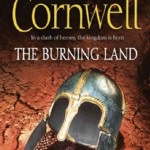
I have been reading Bernard Cornwell for over 25 years now, beginning with the Sharpe Novels, I have found this series set in the period of Alfred the Great the best so far, as I felt he lost his way when he began to do Prequels for Sharpe. There is nothing really outstanding in this, the fifth in the series, it is comfortable, and thus easy to read, but I feel it signals the end of the series, it has far too much padding for me, the twists are no longer surprising, just detours, and as a result frustrate a little. With all this said, I did enjoy it, and will hopefully read the subsequent books finishing the tale of Uhtred.
 The Girl with the Dragon Tattoo is the first of the hugely hyped Stieg Larsson trilogy, I was curious to see what all the hype was about, but as someone who is not usually a crime fiction fan, the trilogy was read by Mrs Fox first, who passed them to me, I must admit I was not very enthusiastic, I would say, though that I was curious because of the rave reviews it was getting. Unlike a large number of people I did not find the beginning of the book tedious, I was gripped by the quirky description, possibly a product of the translation, but the author does not lay everything out, leaving me to construct some detail, for example it appears that the author assumed the reader would be familiar with Sweden, and its culture. I was impressed with the subtle characterisation and the story-telling, there were no twists inserted to artificially increase the complexity. I certainly intend reading the remaining two books of the trilogy.
The Girl with the Dragon Tattoo is the first of the hugely hyped Stieg Larsson trilogy, I was curious to see what all the hype was about, but as someone who is not usually a crime fiction fan, the trilogy was read by Mrs Fox first, who passed them to me, I must admit I was not very enthusiastic, I would say, though that I was curious because of the rave reviews it was getting. Unlike a large number of people I did not find the beginning of the book tedious, I was gripped by the quirky description, possibly a product of the translation, but the author does not lay everything out, leaving me to construct some detail, for example it appears that the author assumed the reader would be familiar with Sweden, and its culture. I was impressed with the subtle characterisation and the story-telling, there were no twists inserted to artificially increase the complexity. I certainly intend reading the remaining two books of the trilogy.
September
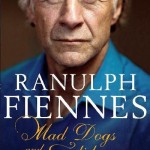 I am a huge fan of Ranulph Fiennes, he is someone who get things done, and does not appear to care what people think about him, I do think he is crazy, and this book shows where he gets it from, not just his father and his grandfather, but his great to the twenty four times grandfather as well. In this book Ranulph Fiennes tells the story of his unconventional; Mad, Bad, crazy, exceptional family, and the places they hold in British, and indeed European History. The writing is also fun and a little crazy, it is a good job that most of the people he writes about are dead, as they could be sueing for slander(although most of his descriptions are accurate), he has a simplified and rather old fashioned view of our History, but this is to be expected from a non-specialist, but one thing is clear, he has a gift for story telling, and the stories he has discovered whilst tracing his family line are well worth telling. A fantastic book in all respects.
I am a huge fan of Ranulph Fiennes, he is someone who get things done, and does not appear to care what people think about him, I do think he is crazy, and this book shows where he gets it from, not just his father and his grandfather, but his great to the twenty four times grandfather as well. In this book Ranulph Fiennes tells the story of his unconventional; Mad, Bad, crazy, exceptional family, and the places they hold in British, and indeed European History. The writing is also fun and a little crazy, it is a good job that most of the people he writes about are dead, as they could be sueing for slander(although most of his descriptions are accurate), he has a simplified and rather old fashioned view of our History, but this is to be expected from a non-specialist, but one thing is clear, he has a gift for story telling, and the stories he has discovered whilst tracing his family line are well worth telling. A fantastic book in all respects.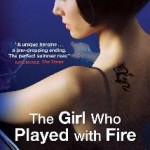
The second of the Millenium trilogy from Stieg Larsson, has been more enjoyable than the previous book, as it is less of a detective story. This book is much more of a a psychological thriller, as it focusses more on the character of Lisbeth Salander, the charismatic girl with the dragon tattoo. I felt too that this book was incomplete, the first one could have been a stand alone, but this one makes no sense without the previous book, and leaves almost everything unresolved, ready for the third book of the triology, which I have begun to read immediately. I have found the complex plot, and more especially characterisation interesting, making this an enjoyable experience.
 these two Stieg Larsson books, should really be one, as they need each other, but I assume the thickness of the resulting book persuaded the publisher to make it two, thus making more money. I think this is the best of the three, despite the over dramatic court scene, written with an eye to a film script me thinks. I do think the style is absorbing, but feel the books could do with a good editor to be outstanding, but for someone who does not usually read this genre, these books have been absorbing, in fact I took time out to finish this one in particular.
these two Stieg Larsson books, should really be one, as they need each other, but I assume the thickness of the resulting book persuaded the publisher to make it two, thus making more money. I think this is the best of the three, despite the over dramatic court scene, written with an eye to a film script me thinks. I do think the style is absorbing, but feel the books could do with a good editor to be outstanding, but for someone who does not usually read this genre, these books have been absorbing, in fact I took time out to finish this one in particular.
October
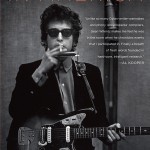 I bought this on the strength of the numerous fantastic reviews, and I was not disappointed, in essence this is a book written by a Dylan fan, for Dylan fans, it is not an introduction to the life of the man, or a review of his music, it is more than this, and at the same time, no of this. Sean Wilentz is an Historian looking at how Dylan’s artistic output came about, he not only looks at who, what and where influenced Dylan, but also the context of that influence. I found the parts looking at the recording of Blonde on Blonde fascinating, and was engrossed by the analysis of the Civil Rights songs we used (http://foggyruins.wordpress.com/). The book clearly argues that Dylan is a innovator, adapting himself to the mood at the time, whilst borrowing from music and poetry. It is a very difficult task, to assess the work of someone who has been producing material for over 50 years, but when this material is diverse and as complex as this, it is next to impossible, this book brings some clarity, but leave questions unanswered, and some myths unexplained, which serves to enhance the mystique of my favourite artist.
I bought this on the strength of the numerous fantastic reviews, and I was not disappointed, in essence this is a book written by a Dylan fan, for Dylan fans, it is not an introduction to the life of the man, or a review of his music, it is more than this, and at the same time, no of this. Sean Wilentz is an Historian looking at how Dylan’s artistic output came about, he not only looks at who, what and where influenced Dylan, but also the context of that influence. I found the parts looking at the recording of Blonde on Blonde fascinating, and was engrossed by the analysis of the Civil Rights songs we used (http://foggyruins.wordpress.com/). The book clearly argues that Dylan is a innovator, adapting himself to the mood at the time, whilst borrowing from music and poetry. It is a very difficult task, to assess the work of someone who has been producing material for over 50 years, but when this material is diverse and as complex as this, it is next to impossible, this book brings some clarity, but leave questions unanswered, and some myths unexplained, which serves to enhance the mystique of my favourite artist.
 I have already read the first three Terry Pratchett books about young witch Tiffany Aching: The Wee Free Men, A Hat Full of Sky, and Wintersmith. Or rather these books are more about Tiffany’s sidekicks, the Nac Mac Feegle, those miniscule blue guys in kilts who are endlessly spoiling for a fight, preferably combined with a drink; men after my own heart. I found the last one, Wintersmith, quite dark, but this one was much lighter, and closer to the earlier Discworld books. The one thing that annoys me is that Pratchett is still classed as a ‘Children’s author’, but these books are deep and complex, this is Tiffany coming of age, maturing, growing as a person and as a witch. The book is stuffed full of wonderful characterisation, and jokes, which as usual make me laugh out loud, and best of all we saw the return of my favourite character: Nanny Ogg.
I have already read the first three Terry Pratchett books about young witch Tiffany Aching: The Wee Free Men, A Hat Full of Sky, and Wintersmith. Or rather these books are more about Tiffany’s sidekicks, the Nac Mac Feegle, those miniscule blue guys in kilts who are endlessly spoiling for a fight, preferably combined with a drink; men after my own heart. I found the last one, Wintersmith, quite dark, but this one was much lighter, and closer to the earlier Discworld books. The one thing that annoys me is that Pratchett is still classed as a ‘Children’s author’, but these books are deep and complex, this is Tiffany coming of age, maturing, growing as a person and as a witch. The book is stuffed full of wonderful characterisation, and jokes, which as usual make me laugh out loud, and best of all we saw the return of my favourite character: Nanny Ogg.
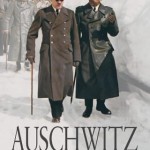 The TV series upon which this book is based was of the highest order, thus I had high expectations of this book, it did not disappoint. This is more than an account of the complex world that we know as Auschwitz, this is a valuable source of material, not only the personal eye-witness accounts, but also the historical argument. Laurence Rees is a gifted Historian, an academic who’s work has been presented primarily on television, but this book shows that he can produce the kind of academic narrative that competes with some of the finest writers of this generation. The book not only enriches the television series, but challenges the assumption one makes when one sees ‘The book that accompanies the TV series’. This is one of the finest books I have read on the subject, and those of you who know me, will also know that I have read a substantial number of books on the subject.
The TV series upon which this book is based was of the highest order, thus I had high expectations of this book, it did not disappoint. This is more than an account of the complex world that we know as Auschwitz, this is a valuable source of material, not only the personal eye-witness accounts, but also the historical argument. Laurence Rees is a gifted Historian, an academic who’s work has been presented primarily on television, but this book shows that he can produce the kind of academic narrative that competes with some of the finest writers of this generation. The book not only enriches the television series, but challenges the assumption one makes when one sees ‘The book that accompanies the TV series’. This is one of the finest books I have read on the subject, and those of you who know me, will also know that I have read a substantial number of books on the subject.
November
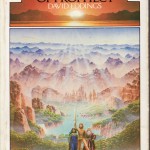 My mother has been reading David Eddings for a number of years now, she has tried to get me to read his work, but I have always resisted, as I feel it is too close to J R R Tolkien’s work. As Rachael has finished reading the first series of books I picked up the first one. It took some time for me to get past my pre-conceptions, but I finished it. It was ok, but nothing spectaular, I cannot really say I enjoyed it, it passed the time, and made a change, but has not really inspired me to read any more.
My mother has been reading David Eddings for a number of years now, she has tried to get me to read his work, but I have always resisted, as I feel it is too close to J R R Tolkien’s work. As Rachael has finished reading the first series of books I picked up the first one. It took some time for me to get past my pre-conceptions, but I finished it. It was ok, but nothing spectaular, I cannot really say I enjoyed it, it passed the time, and made a change, but has not really inspired me to read any more.
December
Please see https://foxburg.edublogs.org/2010/12/11/review-of-dunkirk-to-belsen/ for a detailed review


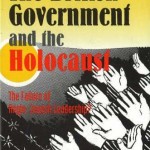
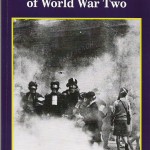




Been studying your blog page for a whilst now so I believed I might as a final point drop a comment. Lately I have grow to be addicted to blogs I believe. I will start out perusing a bit and in advance of I realize it fifty percent the day is gone. I delight in exploring all you’ve on your own site, just stunned how infinite the topics can be out there.
If you think you are beaten, you are.
If you think you dare not, you don’t.
If you’d like to win but think you can’t,
It’s almost certain you won’t.
Life’s battles don’t always go
To the stronger or faster man,
But sooner or later, the man who wins
Is the man who thinks he can.
I am pleased to see a blog, it will help me in many ways.
I have got one idea for your weblog. It looks like at this time there are a couple of cascading stylesheet issues while opening a number of web pages within google chrome as well as opera. It is working okay in internet explorer. Possibly you can double check that.
Wow I wrote a whole comment and had the spam word wrong and have to rewrite it.
Anyway, I posted a comment on another thread, then found this and like your reviews. The reason I am interested is that I have written a novel and have been trying to get it published for several years now. Recently I put it up on Kindle and Have no sales yet. With your ability to do reviews, maybe that is a key to me getting exposure and maybe published. Do you have any ideas?
Thank you for your web site and I will visit again.
You’re a real deep thinekr. Thanks for sharing.
Hi friends, god post aand nice urgihg commented here,
I aam actually enjoying by these.
Here is my blog … xxxkernel.com